Brazil police find draft decree in ex-minister's house to revert election -source
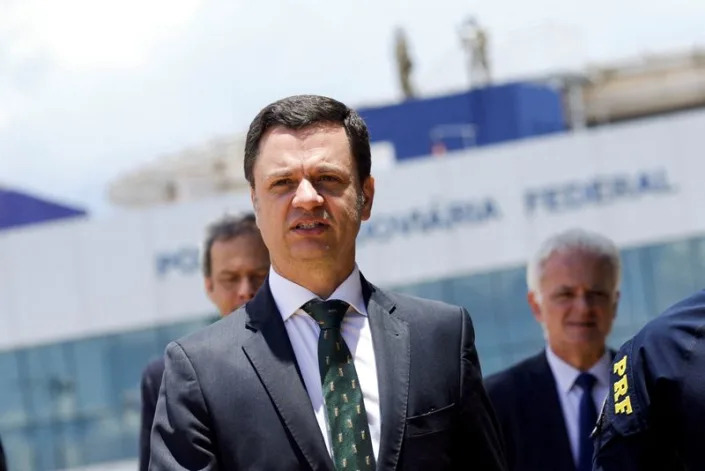
Brazil's Minister of Justice and Public Security Anderson Torres walks on the day of a news conference at Headquarters of the Federal Highway Police in Brasilia
Thu, January 12, 2023
By Ricardo Brito
BRASILIA (Reuters) - Brazilian police found a draft decree in the home of former President Jair Bolsonaro's justice minister that appears to be a proposal to interfere in the result of the October election he lost, two people familiar with the investigation said on Thursday.
The proposed decree, elaborated after Bolsonaro's narrow defeat by President Luiz Inacio Lula da Silva, would establish an emergency "state of defense" for the national election authority, the Superior Electoral Court (TSE), opening the door to altering the result, the sources said.
The document was found on Tuesday when police searched the home of Anderson Torres, who became security chief for Brasilia after Lula took office on Jan. 1, the people said.
A Supreme Court justice ordered the arrest of Torres in connection with the security failures that allowed Bolsonaro supporters to storm government buildings on Sunday trying to provoke a military coup that would oust Lula.
The discovery of the document was first reported by Brazilian newspaper Folha de S. Paulo.
Torres, who left Brazil for Florida after becoming Brasilia security chief, said on social media that the reported document was likely among others in a stack being thrown out and was "leaked" in his absence to create a "false narrative."
"I respect Brazilian democracy. My conscience is clear regarding my actions as minister," Torres wrote.
Analysts said the measures proposed in the document would amount to an unconstitutional conspiracy to meddle in the election.
A lawyer for the former justice minister, Demostenes Torres told Reuters he was not aware of the document, but noted that it was "impossible" to change the election result.
The lawyer said his client would return to Brasilia on Friday to prepare his defense against the arrest warrant relating to Sunday's insurrection in the capital.
The document was ready for presidential signature, the source told Reuters, requesting anonymity to discuss an ongoing investigation.
Bolsonaro, who also flew to Florida 48 hours before his term ended, has still not conceded defeat by Lula.
He briefly posted a video this week on social media suggesting Lula had in fact lost the election. In the run-up to the election, Bolsonaro insisted that Brazil's electronic voting system was vulnerable to fraud, although he has never provided evidence to support his claims.
(Reporting by Ricardo Brito; Writing by Anthony Boadle; Editing by Brad Haynes and Alistair Bell)
Revoke Bolsonaro's visa, 41 U.S. Democrats urge Biden administration
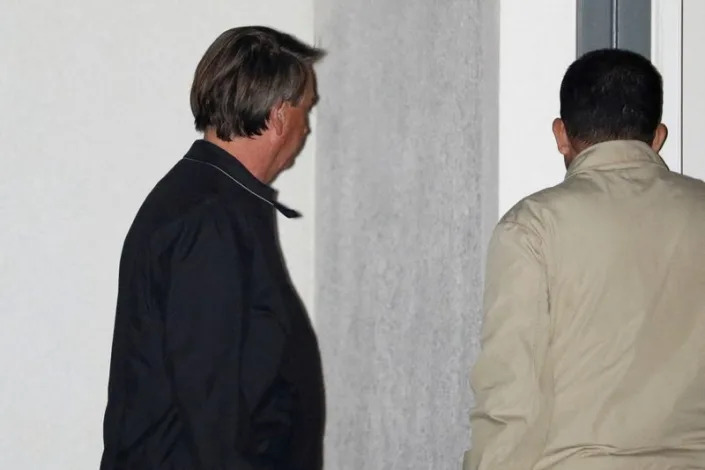
Former Brazilian President Jair Bolsonaro in Florida
Thu, January 12, 2023
By Patricia Zengerle
WASHINGTON (Reuters) - Forty-one Democratic members of the U.S. House of Representatives asked President Joe Biden's administration on Thursday to cooperate with Brazil's investigation into violent protests in Brasilia and revoke any U.S. visas held by former President Jair Bolsonaro.
They sent a letter calling on the administration to support democracy and the rule of law in Brazil. "Furthermore, we must not allow Mr. Bolsonaro or any other former Brazilian officials to take refuge in the United States to escape justice for any crimes they may have committed when in office," the letter said.
Far-right Bolsonaro flew to Florida two days before his term ended on Jan. 1 and leftist President Luiz Inacio Lula da Silva took office.
Supporters of Bolsonaro ransacked Brazil's Congress, Supreme Court and presidential palace on Sunday, calling for a military coup to overturn the October election that Lula won.
State Department and White House officials did not immediately respond to a request for comment on the letter.
The State Department has said repeatedly its policy is not to discuss specific visa cases. Secretary of State Antony Blinken said on Wednesday that Washington had not received any specific requests from Brazil over Bolsonaro.
Bolsonaro has said on social media that he would return to Brazil earlier than planned for medical reasons. He has denied inciting his supporters and said the rioters "crossed the line."
The letter was led by U.S. Representatives Gregory Meeks, the top Democrat and former chairman of the House Foreign Affairs Committee, Joaquin Castro, Ruben Gallego, Chuy Garcia and Susan Wild.
Biden joined other world leaders in condemning Sunday's violence in Brazil.
(Reporting by Patricia Zengerle; Editing by Frances Kerry)

Former Brazilian President Jair Bolsonaro in Florida
Thu, January 12, 2023
By Patricia Zengerle
WASHINGTON (Reuters) - Forty-one Democratic members of the U.S. House of Representatives asked President Joe Biden's administration on Thursday to cooperate with Brazil's investigation into violent protests in Brasilia and revoke any U.S. visas held by former President Jair Bolsonaro.
They sent a letter calling on the administration to support democracy and the rule of law in Brazil. "Furthermore, we must not allow Mr. Bolsonaro or any other former Brazilian officials to take refuge in the United States to escape justice for any crimes they may have committed when in office," the letter said.
Far-right Bolsonaro flew to Florida two days before his term ended on Jan. 1 and leftist President Luiz Inacio Lula da Silva took office.
Supporters of Bolsonaro ransacked Brazil's Congress, Supreme Court and presidential palace on Sunday, calling for a military coup to overturn the October election that Lula won.
State Department and White House officials did not immediately respond to a request for comment on the letter.
The State Department has said repeatedly its policy is not to discuss specific visa cases. Secretary of State Antony Blinken said on Wednesday that Washington had not received any specific requests from Brazil over Bolsonaro.
Bolsonaro has said on social media that he would return to Brazil earlier than planned for medical reasons. He has denied inciting his supporters and said the rioters "crossed the line."
The letter was led by U.S. Representatives Gregory Meeks, the top Democrat and former chairman of the House Foreign Affairs Committee, Joaquin Castro, Ruben Gallego, Chuy Garcia and Susan Wild.
Biden joined other world leaders in condemning Sunday's violence in Brazil.
(Reporting by Patricia Zengerle; Editing by Frances Kerry)
Congress Ramps Up Pressure to Kick Out Bolsonaro as US Bides Time
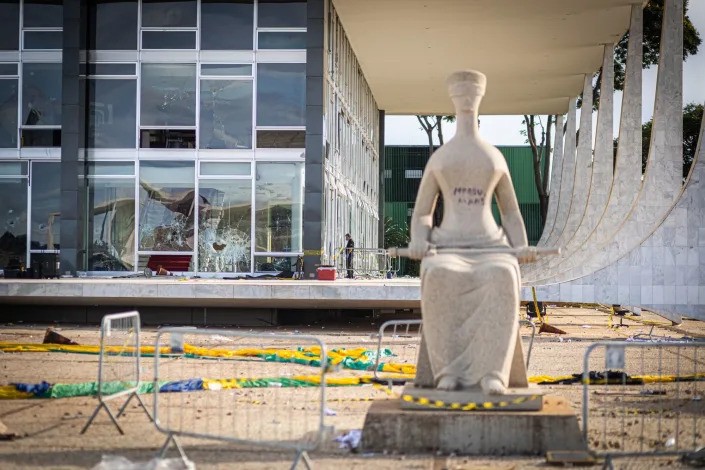
Courtney McBride
Thu, January 12, 2023
(Bloomberg) -- Congressional Democrats added to pressure on President Joe Biden to kick Jair Bolsonaro out of the country, even as US officials stick to a wait-and-see approach in hopes that the former Brazilian president will make good on a promise to return home on his own.
In a letter dated Thursday, 46 congressional Democrats urged Biden to remove Bolsonaro in light of the Jan. 8 attacks by his supporters on government buildings in Brasilia, the capital. They said the violence was “built upon months of pre- and post-election fabrications by Mr. Bolsonaro and his allies” about the October election that Luiz Inacio Lula da Silva narrowly won.
“The United States must not provide shelter for him, or any authoritarian who has inspired such violence against democratic institutions,” the lawmakers wrote, calling on the US to “cooperate fully with any investigation by the Brazilian government into their actions, if requested.”
The letter added to pressure on Biden to do something about Bolsonaro, who traveled to Florida days before Lula’s inauguration on what he said was a vacation. Bolsonaro was seen eating at a KFC and strolling through a Publix supermarket in Florida after he arrived on Dec. 30.
Senate Majority Whip Dick Durbin joined the chorus Thursday evening, urging Biden to rescind authorization for Bolsonaro to remain in the country.
“The United States must not be a safe haven for those who seek to undermine free and fair democratic elections or the peaceful democratic transfer of power, particularly by inciting violence, regardless of the position of power they previously held,” Durbin wrote in his letter to the president.
A former Bolsonaro spokesperson, who remains a friend of his family, didn’t immediately reply to a message seeking more information on the former president’s intentions.
What was initially seen as a bizarre quirk of Brazilian post-election politics became much more serious after last Sunday’s riots by Bolsonaro supporters, and the Biden administration began to assess whether it ought to intervene in some way. That quandary appeared to take care of itself when Bolsonaro, who was briefly hospitalized near Orlando for abdominal pains, told CNN Brasil he would cut short his trip and return home.
But Bolsonaro still hasn’t gone back to Brazil, and the Biden administration is again facing questions about what to do — and whether trying to expel him out would touch off a messy legal battle. It’s believed Bolsonaro came to the US on a diplomatic visa, given that he was still in office at the time of his arrival. The State Department, which wouldn’t comment on Bolsonaro’s specific case, says an individual has 30 days to depart the US or change visa status after leaving government service.
Biden could have the authority to declare Bolsonaro persona non grata and order him out of the country. But that measure is generally used for a foreign diplomat, not a head of state, and it’s not clear if it applies in this case. If Bolsonaro believed he faced the risk of jail by returning home, he could seek asylum or challenge a move to extradite him in US courts.
“This is very complicated and it has to do with international law, the US law, the Vienna Conventions, international customary law and the Constitution,” said Denyse Sabagh, a partner at Duane Morris LLP who specializes in immigration and nationality law.
“You can see many different avenues where, depending on what the US did, his lawyers would argue that he would be entitled to some relief here in the United States,” she said.
Secretary of State Antony Blinken declined even to say Bolsonaro’s name when asked about his case at a briefing on Wednesday.
“We’re talking now about people who are private citizens,” Blinken said. “We’ve heard various public statements that have been made by those individuals about their plans, but we really don’t have anything to add.”
Blinken pointed out that Lula has called for an investigation into the riots but that the US hadn’t received “any specific requests from Brazilian authorities” — indicating that so far Brazilian authorities hadn’t sought to extradite Bolsonaro.
“Of course, if and when we do, we’ll work expeditiously to respond, as we always do,” Blinken said.
Another question is whether Lula even wants Bolsonaro to return to Brazil.
Bolsonaro’s presence could “have a destabilizing impact on not only the country, but also on the ability for Lula to govern,” Jason Marczak, director of the Atlantic Council’s Adrienne Arsht Latin America Center, said in an interview.
Bolsonaro could use his supporters’ anger “to try to continue his relevance and his power in Brazil,” Marczak said. “I think he will try to make it increasingly politically problematic to levy charges against him.”
Although Bolsonaro criticized the riots, he also has continued to feed the disinformation that supporters who participated have embraced, sharing a video of voter fraud conspiracies on Facebook that was deleted hours later.
--With assistance from Daniel Carvalho.

Courtney McBride
Thu, January 12, 2023
(Bloomberg) -- Congressional Democrats added to pressure on President Joe Biden to kick Jair Bolsonaro out of the country, even as US officials stick to a wait-and-see approach in hopes that the former Brazilian president will make good on a promise to return home on his own.
In a letter dated Thursday, 46 congressional Democrats urged Biden to remove Bolsonaro in light of the Jan. 8 attacks by his supporters on government buildings in Brasilia, the capital. They said the violence was “built upon months of pre- and post-election fabrications by Mr. Bolsonaro and his allies” about the October election that Luiz Inacio Lula da Silva narrowly won.
“The United States must not provide shelter for him, or any authoritarian who has inspired such violence against democratic institutions,” the lawmakers wrote, calling on the US to “cooperate fully with any investigation by the Brazilian government into their actions, if requested.”
The letter added to pressure on Biden to do something about Bolsonaro, who traveled to Florida days before Lula’s inauguration on what he said was a vacation. Bolsonaro was seen eating at a KFC and strolling through a Publix supermarket in Florida after he arrived on Dec. 30.
Senate Majority Whip Dick Durbin joined the chorus Thursday evening, urging Biden to rescind authorization for Bolsonaro to remain in the country.
“The United States must not be a safe haven for those who seek to undermine free and fair democratic elections or the peaceful democratic transfer of power, particularly by inciting violence, regardless of the position of power they previously held,” Durbin wrote in his letter to the president.
A former Bolsonaro spokesperson, who remains a friend of his family, didn’t immediately reply to a message seeking more information on the former president’s intentions.
What was initially seen as a bizarre quirk of Brazilian post-election politics became much more serious after last Sunday’s riots by Bolsonaro supporters, and the Biden administration began to assess whether it ought to intervene in some way. That quandary appeared to take care of itself when Bolsonaro, who was briefly hospitalized near Orlando for abdominal pains, told CNN Brasil he would cut short his trip and return home.
But Bolsonaro still hasn’t gone back to Brazil, and the Biden administration is again facing questions about what to do — and whether trying to expel him out would touch off a messy legal battle. It’s believed Bolsonaro came to the US on a diplomatic visa, given that he was still in office at the time of his arrival. The State Department, which wouldn’t comment on Bolsonaro’s specific case, says an individual has 30 days to depart the US or change visa status after leaving government service.
Biden could have the authority to declare Bolsonaro persona non grata and order him out of the country. But that measure is generally used for a foreign diplomat, not a head of state, and it’s not clear if it applies in this case. If Bolsonaro believed he faced the risk of jail by returning home, he could seek asylum or challenge a move to extradite him in US courts.
“This is very complicated and it has to do with international law, the US law, the Vienna Conventions, international customary law and the Constitution,” said Denyse Sabagh, a partner at Duane Morris LLP who specializes in immigration and nationality law.
“You can see many different avenues where, depending on what the US did, his lawyers would argue that he would be entitled to some relief here in the United States,” she said.
Secretary of State Antony Blinken declined even to say Bolsonaro’s name when asked about his case at a briefing on Wednesday.
“We’re talking now about people who are private citizens,” Blinken said. “We’ve heard various public statements that have been made by those individuals about their plans, but we really don’t have anything to add.”
Blinken pointed out that Lula has called for an investigation into the riots but that the US hadn’t received “any specific requests from Brazilian authorities” — indicating that so far Brazilian authorities hadn’t sought to extradite Bolsonaro.
“Of course, if and when we do, we’ll work expeditiously to respond, as we always do,” Blinken said.
Another question is whether Lula even wants Bolsonaro to return to Brazil.
Bolsonaro’s presence could “have a destabilizing impact on not only the country, but also on the ability for Lula to govern,” Jason Marczak, director of the Atlantic Council’s Adrienne Arsht Latin America Center, said in an interview.
Bolsonaro could use his supporters’ anger “to try to continue his relevance and his power in Brazil,” Marczak said. “I think he will try to make it increasingly politically problematic to levy charges against him.”
Although Bolsonaro criticized the riots, he also has continued to feed the disinformation that supporters who participated have embraced, sharing a video of voter fraud conspiracies on Facebook that was deleted hours later.
--With assistance from Daniel Carvalho.
Brazil reckons with artistic treasures ruined in riot

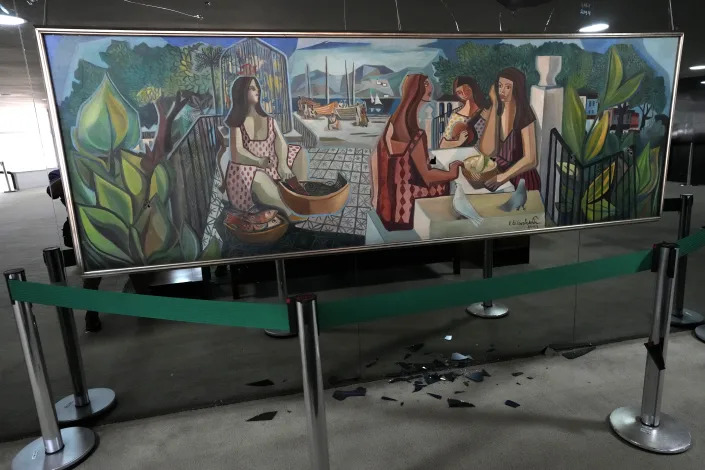
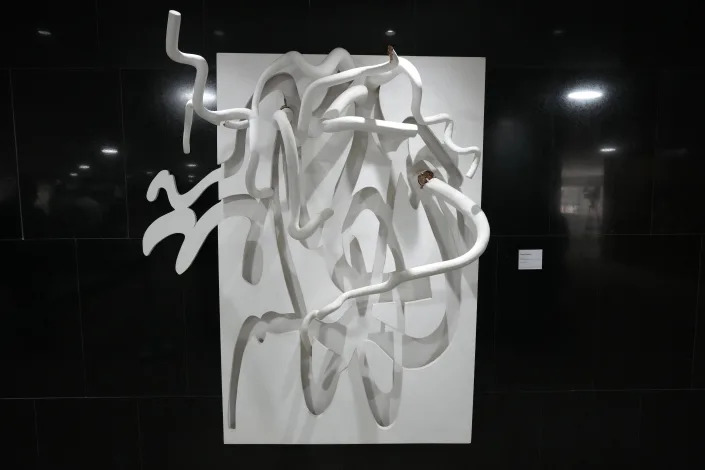
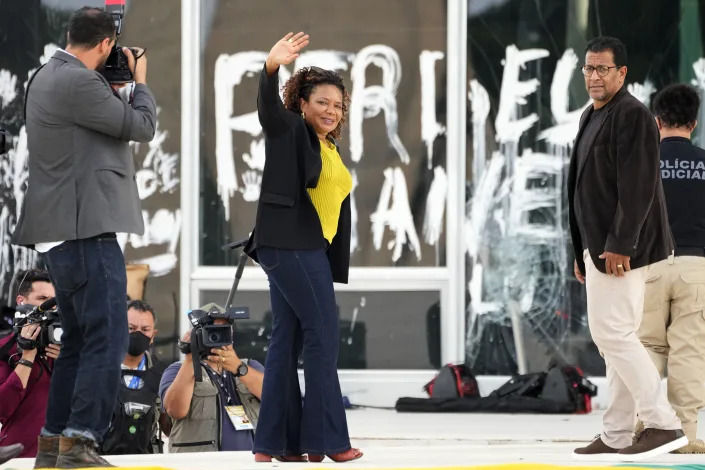
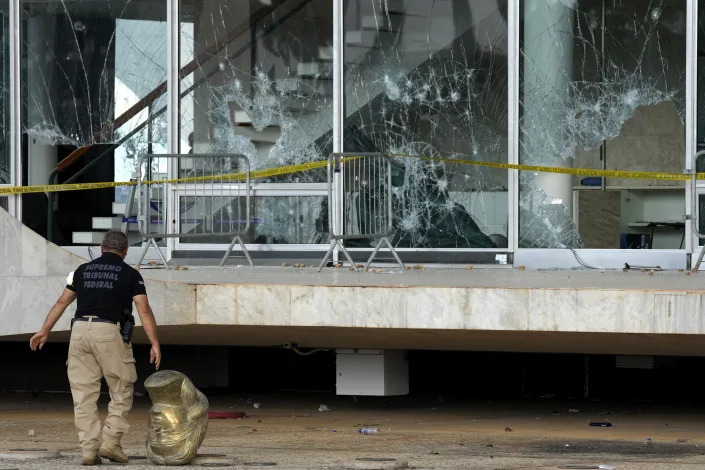
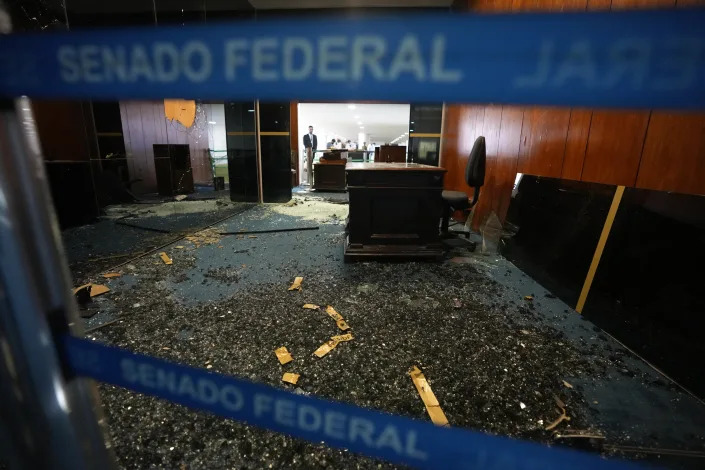
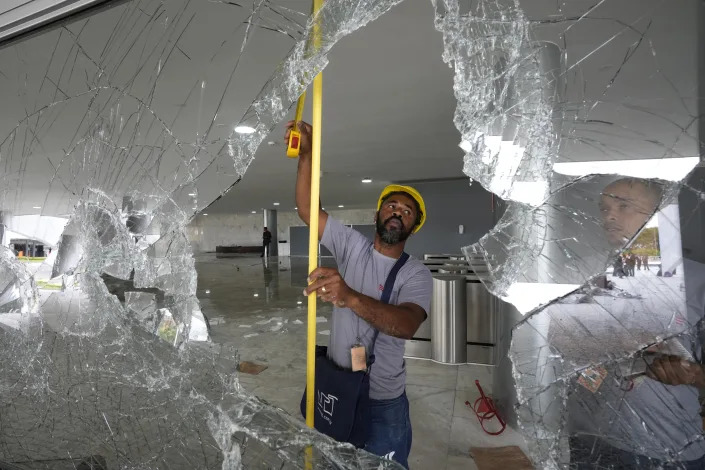
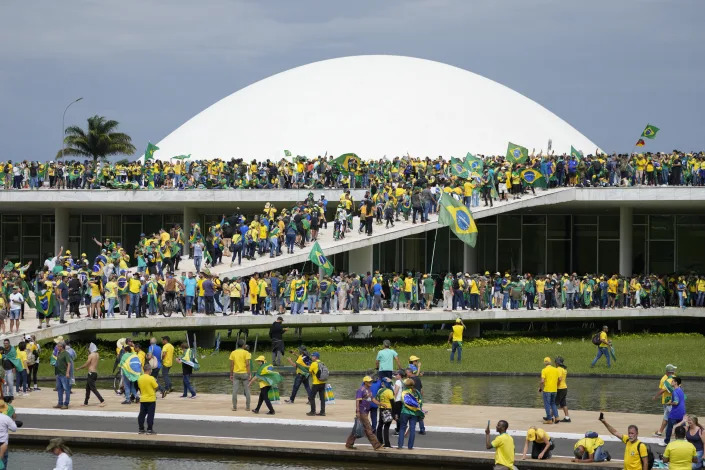
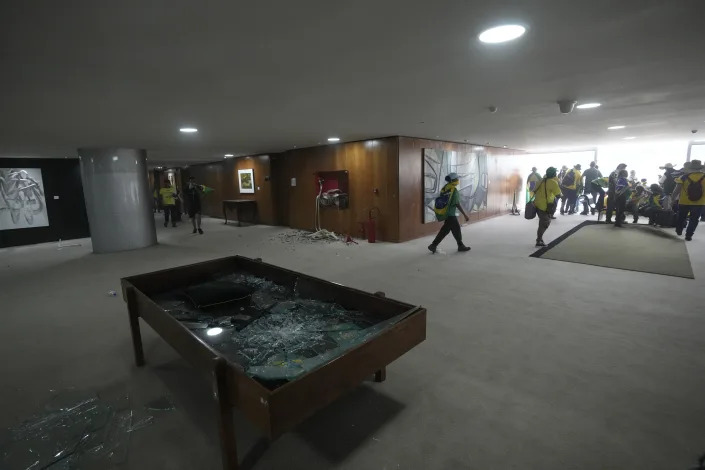
Protesters, supporters of Brazil's former President Jair Bolsonaro, storm the Planalto Palace in Brasilia, Brazil, Sunday, Jan. 8, 2023. Planalto is the official workplace of the president of Brazil.
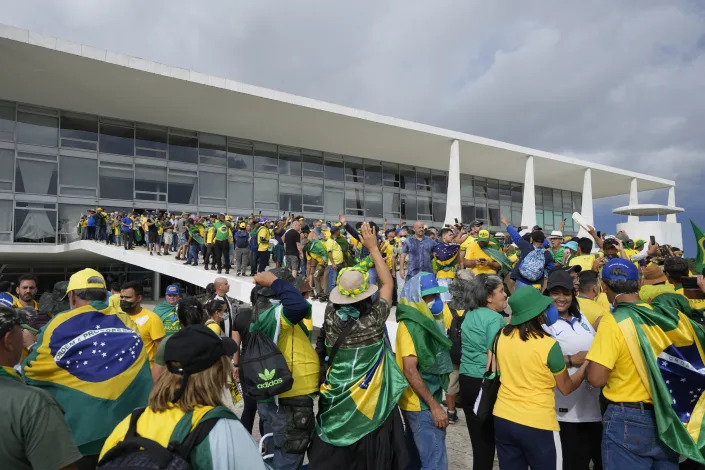
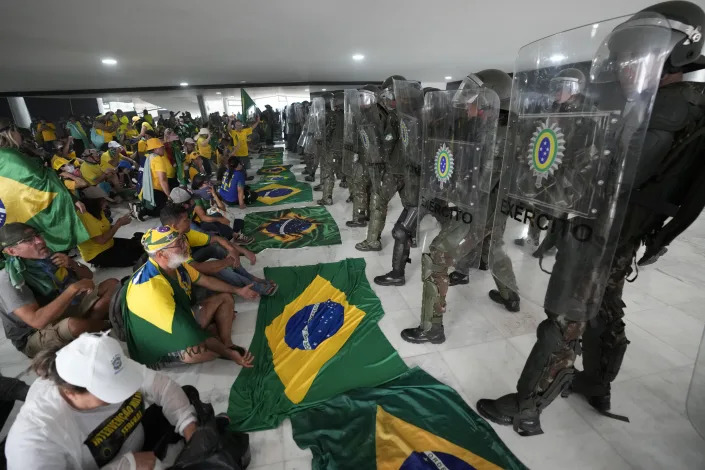
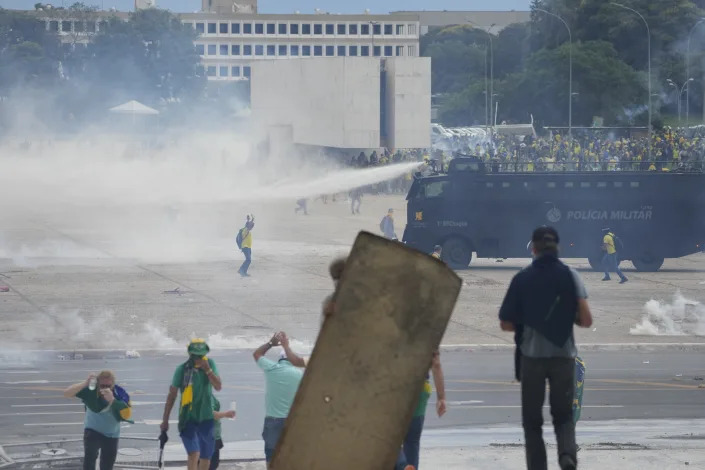
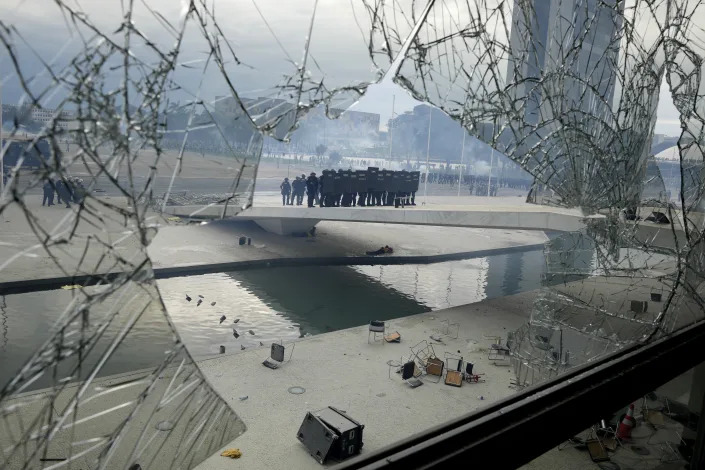
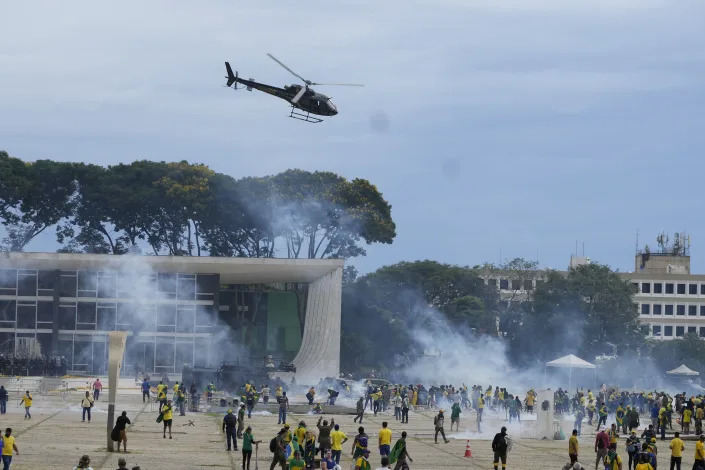
Protesters, supporters of Brazil's former President Jair Bolsonaro, clash with police as they storm the Planalto Palace in Brasilia, Brazil, Sunday, Jan. 8, 2023. Planalto is the official workplace of the president of Brazil.
First to fall after Brasilia riots: the Bolsonarista running capital security
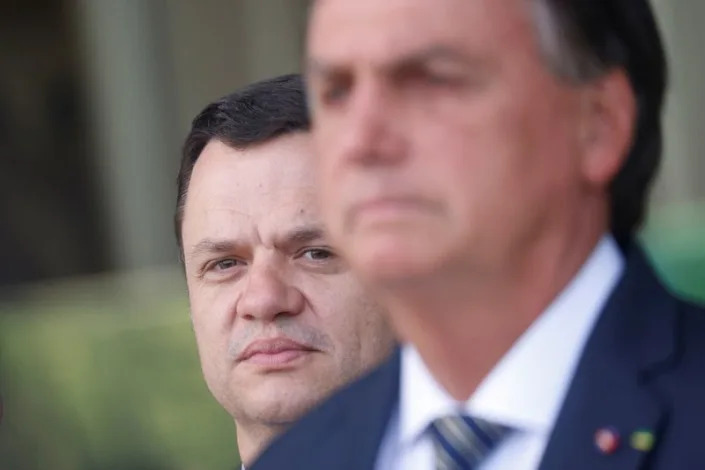
Brazil's Minister of Justice Anderson Torres looks on next to Brazil's President and candidate for re-election Jair Bolsonaro during a news conference at the Alvorada Palace in Brasilia
Wed, January 11, 2023
By Gabriel Stargardter and Brad Haynes
RIO DE JANEIRO (Reuters) - When Brazilian rioters stormed government buildings in Brasilia on Sunday, the man tasked with keeping the city safe was a continent away in Florida - the same state his ex-boss, former President Jair Bolsonaro, had relocated to after losing last year's election.
Anderson Torres, Bolsonaro's justice minister from 2021 to 2022, took a job as Brasilia security chief after leftist President Luiz Inacio Lula da Silva took office on Jan. 1.
He did not last long. Within hours of the Jan. 8 invasion of Brazil's presidential palace, Supreme Court and Congress by election-denying Bolsonaro supporters, Torres had lost his new gig - becoming the first to fall in recriminations after the worst assault on Brazil's institutions since the country's return to democracy in the 1980s.
"This was a structured sabotage operation, commanded by Bolsonaro's ex-minister Anderson Torres," Ricardo Cappelli, the official leading a post-invasion federal intervention into Brasilia's public security, told CNN Brasil.
"Torres took over as secretary for security (in Brasilia), dismissed the whole chain of command and then took a trip. If that's not sabotage, I don't know what is."
Supreme Court Justice Alexandre de Moraes issued an arrest warrant for Torres on Tuesday. It was not immediately clear what the charges were, but Moraes cited alleged "omission" and "connivance" by Torres.
Later on Tuesday, Torres said he would return to Brazil, hand himself over to authorities and prepare his defense.
"My actions have always been driven by ethics and legality," he wrote on Twitter.
Ibaneis Rocha, the governor of the federal district, sacked Torres amid the chaos on Sunday afternoon, just hours before a Supreme Court order suspended Rocha from office for 90 days.
The shakeup of capital security highlights a wider challenge facing Lula, whose new government must now deal with a sweeping criminal investigation of the Brasilia riots while establishing a fresh chain of command among police and security forces.
Many rank-and-file officers have long sympathized with the law-and-order appeal of Bolsonaro's hard-right politics, and the former president spent the past four years stacking federal law enforcement organs with loyalists.
For example, the appointment of Torres, 47, at the Justice Ministry followed years of friendly relations with Bolsonaro's family.
As police dug into graft allegations against Bolsonaro's sons early in his term, then-Justice Minister Sergio Moro accused the president of trying to swap the head of the federal police to protect them. Bolsonaro denied any such interference.
When Moro quit in April 2020 over the alleged meddling, Brazilian media reported that the president had suggested Torres to run the federal police, but his former colleagues there resisted the idea due to his lack of seniority.
At the time, Torres was in his first stint as security chief for the federal district under Rocha, where he remained until the president tapped him for the Justice Ministry in March 2021.
Within a week, Torres, with Bolsonaro's approval, replaced the head of the federal police. He also replaced the head of the federal highway police (PRF) with Silvinei Vasques, whose name would hang over last year's election.
During the Oct. 30 runoff between Lula and Bolsonaro, the PRF faced accusations of conducting illegal highway roadblocks in Lula strongholds in northeastern Brazil, in what critics said amounted to voter suppression efforts.
Vasques, who had campaigned openly for Bolsonaro on social media, was charged in November with abusing his role to favor Bolsonaro politically and was dismissed last month.
Torres came under fire for his close involvement with PRF operations during the election but did not face charges.
Formally questioned by the Supreme Court about allegations of voter suppression, Torres denied interfering in the election.
(Reporting by Gabriel Stargardter in Rio de Janeiro and Brad Haynes in Sao Paulo; Additional reporting by Ricardo Brito in Brasilia; Editing by Bradley Perrett)









Protesters, supporters of Brazil's former President Jair Bolsonaro, storm the Planalto Palace in Brasilia, Brazil, Sunday, Jan. 8, 2023. Planalto is the official workplace of the president of Brazil.
(AP Photo/Eraldo Peres)
MARIO LOBAO and DAVID BILLER
Thu, January 12, 2023 at 5:28 PM MST·2 min read
BRASILIA, Brazil (AP) — The horde of rioters who invaded government buildings on Jan. 8 in an attack on Brazil's democracy left behind a trail of destruction whose full scope is only now coming into full view.
Following a painstaking survey of the ruins, the national artistic heritage institute on Thursday night released a 50-page report, the bulk of which is a photographic catalog of the damages. They go far beyond the shattered glass on the exteriors of the presidential palace, Congress and Supreme Court, all architectural icons.
Modernist furniture was burned, portraits defaced, sculptures decapitated and ceramics smashed. Carpets were found soaked with water from the buildings' sprinkler systems, as well as with urine.
The rioters — die-hard supporters of former President Jair Bolsonaro who refuse to accept his election defeat — marred the iconic marble ramp leading up the presidential palace with scratches, some stretching two feet in length, according to the report. Into a historic wooden table at the Supreme Court they carved “Supreme are the people” — a phrase popular among backers of Bolsonaro, who often strained against the checks of the top court.
Among the artworks destroyed was a 17th-century clock made by Balthazar Martinot and that the French royal court gifted to the Portuguese King. The only other Martinot clock in existence is in France’s Palace of Versailles, though is half the size, Brazil's presidency said in a statement. A 60-year-old bronze sculpture of a flautist by Bruno Giorgi was also thrashed (should this be trashed?), and its pieces found spread across a room on the presidential palace's third floor.
Vandals pitched rocks through the canvas of a mural by Emiliano Di Calvalcanti. The presidential palace said in its statement that the painting, “As Mulatas”, is valued at some $1.5 million, though works of that size tend to fetch quintuple that amount at auction.
“The damage was not random, it was obviously deliberate," Rogerio Carvalho, the presidential palace's curator, said in an interview while sitting before the disfigured painting. The work "was perforated in seven places using rocks taken from the square with a pickaxe. Which is to say, there is a movement of intolerance toward what this palace represents.”
The total cost of the destruction hasn't yet been established. Senate president Rodrigo Pacheco placed the damage in his congressional chamber alone in the millions.
The day after the uprising, Justice Minister Flávio Dino said Federal Police surveys will enable the attorney-general's office to hold perpetrators financially responsible.
This collection “is an artistic treasure of the Brazilian people, which belongs to the nation and whose integrity needs to be respected,” Brazil’s culture minister, Margareth Menezes, told reporters on Tuesday. “The idea is to create a memorial about this violence we suffered, so that it never happens again.”
__
AP writer Biller reported from Rio de Janeiro
MARIO LOBAO and DAVID BILLER
Thu, January 12, 2023 at 5:28 PM MST·2 min read
BRASILIA, Brazil (AP) — The horde of rioters who invaded government buildings on Jan. 8 in an attack on Brazil's democracy left behind a trail of destruction whose full scope is only now coming into full view.
Following a painstaking survey of the ruins, the national artistic heritage institute on Thursday night released a 50-page report, the bulk of which is a photographic catalog of the damages. They go far beyond the shattered glass on the exteriors of the presidential palace, Congress and Supreme Court, all architectural icons.
Modernist furniture was burned, portraits defaced, sculptures decapitated and ceramics smashed. Carpets were found soaked with water from the buildings' sprinkler systems, as well as with urine.
The rioters — die-hard supporters of former President Jair Bolsonaro who refuse to accept his election defeat — marred the iconic marble ramp leading up the presidential palace with scratches, some stretching two feet in length, according to the report. Into a historic wooden table at the Supreme Court they carved “Supreme are the people” — a phrase popular among backers of Bolsonaro, who often strained against the checks of the top court.
Among the artworks destroyed was a 17th-century clock made by Balthazar Martinot and that the French royal court gifted to the Portuguese King. The only other Martinot clock in existence is in France’s Palace of Versailles, though is half the size, Brazil's presidency said in a statement. A 60-year-old bronze sculpture of a flautist by Bruno Giorgi was also thrashed (should this be trashed?), and its pieces found spread across a room on the presidential palace's third floor.
Vandals pitched rocks through the canvas of a mural by Emiliano Di Calvalcanti. The presidential palace said in its statement that the painting, “As Mulatas”, is valued at some $1.5 million, though works of that size tend to fetch quintuple that amount at auction.
“The damage was not random, it was obviously deliberate," Rogerio Carvalho, the presidential palace's curator, said in an interview while sitting before the disfigured painting. The work "was perforated in seven places using rocks taken from the square with a pickaxe. Which is to say, there is a movement of intolerance toward what this palace represents.”
The total cost of the destruction hasn't yet been established. Senate president Rodrigo Pacheco placed the damage in his congressional chamber alone in the millions.
The day after the uprising, Justice Minister Flávio Dino said Federal Police surveys will enable the attorney-general's office to hold perpetrators financially responsible.
This collection “is an artistic treasure of the Brazilian people, which belongs to the nation and whose integrity needs to be respected,” Brazil’s culture minister, Margareth Menezes, told reporters on Tuesday. “The idea is to create a memorial about this violence we suffered, so that it never happens again.”
__
AP writer Biller reported from Rio de Janeiro
BECAUSE OF COURSE THEY DID
Brazil rioters plotted openly online, pitched huge 'party'




Protesters, supporters of Brazil's former President Jair Bolsonaro, clash with police as they storm the Planalto Palace in Brasilia, Brazil, Sunday, Jan. 8, 2023. Planalto is the official workplace of the president of Brazil.
(AP Photo/Eraldo Peres)
JOSHUA GOODMAN and DAVID KLEPPER
Wed, January 11, 2023
MIAMI (AP) — The map was called “Beach Trip” and was blasted out to more than 18,000 members of a public Telegram channel called, in Portuguese, “Hunting and Fishing.”
But instead of outdoor recreation tips, the 43 pins spread across the map of Brazil pointed to cities where bus transportation to the capital could be found for what promoters promised would a huge “party” on Jan. 8.
“Children and the elderly aren’t invited,” according to the post circulated on the Telegram channel, which has since been removed. “Only adults willing to participate in all the games, including target shooting of police and robbers, musical chairs, indigenous dancing, tag, and others.”
The post was one of several thinly coded messages circulating on social media ahead of Sunday's violent attack on the capital by supporters of former President Jair Bolsonaro looking to restore the far-right leader to power.
It’s also now a potentially vital lead in a fledgling criminal investigation about how the rampage was organized and how officials missed clues to a conspiracy that, like the Jan. 6 attack on the U.S. Capitol two years ago, appears to have been organized and carried out in plain view.
And like the attack in the U.S., the Brazilian riots demonstrate how social media makes it easier than ever for anti-democratic groups to recruit followers and transform online rhetoric into offline action.
On YouTube, rioters livestreaming the mayhem racked up hundreds of thousands of views before a Brazilian judge ordered social media platforms to remove such content. Misleading claims about the election and the uprising also could be found on Twitter, Facebook and other platforms.
But even before Sunday's riot, social media and private messaging networks in Brazil were being flooded with calls for one final push to overturn the October election of Luiz Inacio Lula da Silva — something authorities appear to have inexplicably missed or ignored.
Most of the online chatter referred to the planned gathering at Brasilia's Three Powers Plaza as “Selma’s party” — a play on the Portuguese word for “selva,” a battle cry used by Brazil’s military.
Participants were told to bring their own mask to protect against “pepper pie in the face” — or pepper spray fired by security forces. They also were told to dress in the green and yellow of Brazil’s flag — and not the red preferred by Lula's Workers’ Party.
“Get ready guests, the party will be a blast,” the widely-circulated post said.
“It was all in the open,” said David Nemer, a Brazil native and University of Virginia professor who studies social media. “They listed the people responsible for buses, with their full names and contact information. They weren’t trying to hide anything.”
Still, it's unclear to what extent social media was responsible for the worst attack on Brazil’s democracy in decades. Only a handful of far-right activists showed up at gas terminals and refineries that were also pinpointed on the “Beach Trip” map as locations for demonstrations planned for Sunday.
Bruno Fonseca, a journalist for Agencia Publica, a digital investigative journalism outlet, has tracked the online activities of pro-Bolsonaro groups for years. He said the activists live in a state of constant confrontation but sometimes, their frequent calls to mobilize fall flat.
“It's difficult to know when something will jump out from social media and not,” said Fonseca, who in a report this week traced the spread of the “Selma's Party” post to users who appear to be bots.
Still, he said, authorities could have paired the online activity with other intelligence-gathering tools to investigate, for example, a surge in bus traffic to the capital before the attacks. He said their inaction may reflect negligence or the deep support for Bolsonaro among security forces.
One gnawing question is why, on the day of the chaos, Anderson Torres, a Bolsonaro ally who had just been named the top security official in Brasilia, was reportedly in Florida — where his former boss was on a retreat. Torres was swiftly fired and Brazil's Supreme Court has ordered his arrest pending an investigation. Torres denied any wrongdoing and said he would return to Brazil and present his defense.
Sunday's violence came after Brazilian voters were bombarded by a flood of false and misleading claims before last fall’s vote. Much of the content focused on unfounded concerns about electronic voting, and some featured threats of violent retaliation if Bolsonaro was defeated.
One of the most popular rallying cries used by Bolsonaro's supporters was #BrazilianSpring, a term coined by former Trump aide Steve Bannon in the hours after Bolsonaro's defeat to Lula.
“We all know that this Brazilian election was going to be contentious,” said Flora Rebello Arduini, a London-based campaign director with SumOfUs, a nonprofit that tracked extremist content before and after Brazil’s election. “Social media platforms played a vital role in amplifying far-right extremist voices and even calls for violent uprising. If we can identify this kind of content, then so can they (the companies). Incompetence is not an excuse.”
Brazil’s capital city steeled itself Wednesday for the possibility of new attacks fueled by social media posts, including one circulating on Telegram calling for a “mega protest to retake power.” But those protests fizzled.
In response to the criticism, spokespeople for Telegram, YouTube and Facebook said their companies were working to remove content urging more violence.
“Telegram is a platform for free speech and peaceful protest,” Telegram spokesman Remi Vaughn wrote in a statement to the AP. “Calls to violence are explicitly forbidden and dozens of public communities where such calls were being made have been blocked in Brazil in the past week — both proactively as per our Terms of Service as well as in response to court orders.”
A YouTube spokeswoman said the platform has removed more than 2,500 channels and more than 10,000 videos related to the election in Brazil.
Meta, which owns Facebook, Instagram and WhatsApp, has prioritized efforts to combat harmful content about Brazil's election, a company spokesman told The Associated Press.
—
Klepper reported from Washington, D.C.
JOSHUA GOODMAN and DAVID KLEPPER
Wed, January 11, 2023
MIAMI (AP) — The map was called “Beach Trip” and was blasted out to more than 18,000 members of a public Telegram channel called, in Portuguese, “Hunting and Fishing.”
But instead of outdoor recreation tips, the 43 pins spread across the map of Brazil pointed to cities where bus transportation to the capital could be found for what promoters promised would a huge “party” on Jan. 8.
“Children and the elderly aren’t invited,” according to the post circulated on the Telegram channel, which has since been removed. “Only adults willing to participate in all the games, including target shooting of police and robbers, musical chairs, indigenous dancing, tag, and others.”
The post was one of several thinly coded messages circulating on social media ahead of Sunday's violent attack on the capital by supporters of former President Jair Bolsonaro looking to restore the far-right leader to power.
It’s also now a potentially vital lead in a fledgling criminal investigation about how the rampage was organized and how officials missed clues to a conspiracy that, like the Jan. 6 attack on the U.S. Capitol two years ago, appears to have been organized and carried out in plain view.
And like the attack in the U.S., the Brazilian riots demonstrate how social media makes it easier than ever for anti-democratic groups to recruit followers and transform online rhetoric into offline action.
On YouTube, rioters livestreaming the mayhem racked up hundreds of thousands of views before a Brazilian judge ordered social media platforms to remove such content. Misleading claims about the election and the uprising also could be found on Twitter, Facebook and other platforms.
But even before Sunday's riot, social media and private messaging networks in Brazil were being flooded with calls for one final push to overturn the October election of Luiz Inacio Lula da Silva — something authorities appear to have inexplicably missed or ignored.
Most of the online chatter referred to the planned gathering at Brasilia's Three Powers Plaza as “Selma’s party” — a play on the Portuguese word for “selva,” a battle cry used by Brazil’s military.
Participants were told to bring their own mask to protect against “pepper pie in the face” — or pepper spray fired by security forces. They also were told to dress in the green and yellow of Brazil’s flag — and not the red preferred by Lula's Workers’ Party.
“Get ready guests, the party will be a blast,” the widely-circulated post said.
“It was all in the open,” said David Nemer, a Brazil native and University of Virginia professor who studies social media. “They listed the people responsible for buses, with their full names and contact information. They weren’t trying to hide anything.”
Still, it's unclear to what extent social media was responsible for the worst attack on Brazil’s democracy in decades. Only a handful of far-right activists showed up at gas terminals and refineries that were also pinpointed on the “Beach Trip” map as locations for demonstrations planned for Sunday.
Bruno Fonseca, a journalist for Agencia Publica, a digital investigative journalism outlet, has tracked the online activities of pro-Bolsonaro groups for years. He said the activists live in a state of constant confrontation but sometimes, their frequent calls to mobilize fall flat.
“It's difficult to know when something will jump out from social media and not,” said Fonseca, who in a report this week traced the spread of the “Selma's Party” post to users who appear to be bots.
Still, he said, authorities could have paired the online activity with other intelligence-gathering tools to investigate, for example, a surge in bus traffic to the capital before the attacks. He said their inaction may reflect negligence or the deep support for Bolsonaro among security forces.
One gnawing question is why, on the day of the chaos, Anderson Torres, a Bolsonaro ally who had just been named the top security official in Brasilia, was reportedly in Florida — where his former boss was on a retreat. Torres was swiftly fired and Brazil's Supreme Court has ordered his arrest pending an investigation. Torres denied any wrongdoing and said he would return to Brazil and present his defense.
Sunday's violence came after Brazilian voters were bombarded by a flood of false and misleading claims before last fall’s vote. Much of the content focused on unfounded concerns about electronic voting, and some featured threats of violent retaliation if Bolsonaro was defeated.
One of the most popular rallying cries used by Bolsonaro's supporters was #BrazilianSpring, a term coined by former Trump aide Steve Bannon in the hours after Bolsonaro's defeat to Lula.
“We all know that this Brazilian election was going to be contentious,” said Flora Rebello Arduini, a London-based campaign director with SumOfUs, a nonprofit that tracked extremist content before and after Brazil’s election. “Social media platforms played a vital role in amplifying far-right extremist voices and even calls for violent uprising. If we can identify this kind of content, then so can they (the companies). Incompetence is not an excuse.”
Brazil’s capital city steeled itself Wednesday for the possibility of new attacks fueled by social media posts, including one circulating on Telegram calling for a “mega protest to retake power.” But those protests fizzled.
In response to the criticism, spokespeople for Telegram, YouTube and Facebook said their companies were working to remove content urging more violence.
“Telegram is a platform for free speech and peaceful protest,” Telegram spokesman Remi Vaughn wrote in a statement to the AP. “Calls to violence are explicitly forbidden and dozens of public communities where such calls were being made have been blocked in Brazil in the past week — both proactively as per our Terms of Service as well as in response to court orders.”
A YouTube spokeswoman said the platform has removed more than 2,500 channels and more than 10,000 videos related to the election in Brazil.
Meta, which owns Facebook, Instagram and WhatsApp, has prioritized efforts to combat harmful content about Brazil's election, a company spokesman told The Associated Press.
—
Klepper reported from Washington, D.C.
Blame the voting machines: Brazil riots fit global pattern
Anuj Chopra, with Luiza Queiroz in Sao Paulo and Rossen Bossev in Sofia
Wed, January 11, 2023
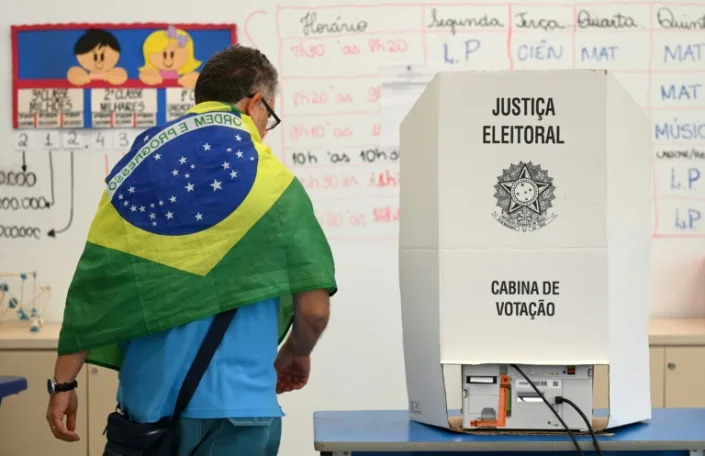
Mobs of rioters who stormed Brazil's seats of power raised conspiracy-laden slogans against voting machines, a prime target of disinformation campaigns seeking to undermine trust in electoral systems around the world.
Far-right ex-president Jair Bolsonaro's supporters, who invaded the presidential palace, Congress and Supreme Court in the capital Brasilia on Sunday, demanded access to the "source code" of electronic voting machines.
That slogan effectively questioned the reliability of voting equipment after a bitterly contested election that saw Bolsonaro defeated by his leftist rival Luiz Inacio Lula da Silva.
The right-wing rage was the latest illustration of the impact of disinformation campaigns that have sought to cast doubt on voting machines from the United States to France, Bulgaria and the Philippines.
"This scenario of rioting and insurrection over baseless theories fueled by technology opacity are very dangerous for the stability of global democracies," Gregory Miller, the co-founder of the nonpartisan nonprofit OSET Institute, told AFP.
Brazil has used voting machines in its elections since 1996, but they only recently became mired in controversy, with Bolsonaro leading allegations that they were plagued by fraud.
No major security flaw has ever been detected, with political parties, the judiciary and the military allowed to inspect the source code and tests conducted by technology experts to protect against hacking.
- Trumpian playbook -
The Brazilian riots bore chilling similarities to the insurrection at the US Capitol on January 6, 2021 by supporters of former president Donald Trump, who claimed the 2020 election had been stolen from him.
Far-right campaigns falsely asserted that voting machines manipulated votes away from Trump in 2020. Voting technology companies have filed a flurry of lawsuits against Trump allies and media outlets for false claims that they rigged the vote.
Still, ahead of the 2022 midterm elections in the United States, conspiracy-endorsing Republican politicians amped up their rhetoric against the machines as two swing state counties moved to allow hand counting.
The contentious push for hand counting came even though US experts warned that it is often less accurate than machine counting and prone to delays.
A 2018 study published in the Election Law Journal analyzed two statewide recounts in Wisconsin, including the 2016 presidential election. It found that "vote counts originally conducted by computerized scanners were, on average, more accurate."
But the rhetoric against the machines continued after the widely anticipated Republican "red wave" failed to materialize in the November midterms.
Steve Bannon, Trump's former aide who has been sentenced to four months prison for disobeying a subpoena to testify on the January 6 Capitol attack, was closely involved with the Bolsonaro team's spread of misinformation.
In November, Bannon pushed the baseless claim that electronic voting machines were used in Brazil "to steal elections." On Sunday, Bannon lauded the Brazilian rioters on social media as "freedom fighters."
- 'Robust checks' -
Citing the examples of the United States and Brazil, far-right French politician Florian Philippot tweeted earlier this week that electronic voting bred "doubt, fraud, chaos."
His comments followed a series of online claims that bugs affecting electronic voting machines favored Emmanuel Macron in the second round of the 2022 presidential election, which he won.
The claims were widely dismissed by media watchdogs such as NewsGuard and AFP's factcheckers debunked several false claims about the reliability of voting equipment in France.
But Philippot still cast doubt on electronic voting.
"Let's eliminate all machine voting in France," the politician wrote on Twitter.
Similar distrust has been rampant in Bulgaria.
In 2021, Bulgaria's parliament passed a law to introduce machine voting amid widespread suspicion of fraud with paper ballots.
However, paper ballots were returned the following year after sustained disinformation campaigns eroded public trust in the machines. Traditional parties implied, without offering consistent evidence, that the machines were unreliable and prone to manipulation.
To eliminate such fears, Miller argued for an "urgent" need for democracies to make election infrastructure fully transparent to the public.
Experts such as Pamela Smith also called on countries to collate "hard election evidence" to boost public confidence in machine voting.
"We advocate for a physical record of voter intent, used in robust post-election checks on the machine-reported outcome, with plenty of transparency," Smith, president of the nonpartisan nonprofit Verified Voting, told AFP.
"Every country should work toward that goal. An election outcome... should not be subverted by whoever shouts the loudest."
burs-ac/bgs/mlm
Anuj Chopra, with Luiza Queiroz in Sao Paulo and Rossen Bossev in Sofia
Wed, January 11, 2023

Mobs of rioters who stormed Brazil's seats of power raised conspiracy-laden slogans against voting machines, a prime target of disinformation campaigns seeking to undermine trust in electoral systems around the world.
Far-right ex-president Jair Bolsonaro's supporters, who invaded the presidential palace, Congress and Supreme Court in the capital Brasilia on Sunday, demanded access to the "source code" of electronic voting machines.
That slogan effectively questioned the reliability of voting equipment after a bitterly contested election that saw Bolsonaro defeated by his leftist rival Luiz Inacio Lula da Silva.
The right-wing rage was the latest illustration of the impact of disinformation campaigns that have sought to cast doubt on voting machines from the United States to France, Bulgaria and the Philippines.
"This scenario of rioting and insurrection over baseless theories fueled by technology opacity are very dangerous for the stability of global democracies," Gregory Miller, the co-founder of the nonpartisan nonprofit OSET Institute, told AFP.
Brazil has used voting machines in its elections since 1996, but they only recently became mired in controversy, with Bolsonaro leading allegations that they were plagued by fraud.
No major security flaw has ever been detected, with political parties, the judiciary and the military allowed to inspect the source code and tests conducted by technology experts to protect against hacking.
- Trumpian playbook -
The Brazilian riots bore chilling similarities to the insurrection at the US Capitol on January 6, 2021 by supporters of former president Donald Trump, who claimed the 2020 election had been stolen from him.
Far-right campaigns falsely asserted that voting machines manipulated votes away from Trump in 2020. Voting technology companies have filed a flurry of lawsuits against Trump allies and media outlets for false claims that they rigged the vote.
Still, ahead of the 2022 midterm elections in the United States, conspiracy-endorsing Republican politicians amped up their rhetoric against the machines as two swing state counties moved to allow hand counting.
The contentious push for hand counting came even though US experts warned that it is often less accurate than machine counting and prone to delays.
A 2018 study published in the Election Law Journal analyzed two statewide recounts in Wisconsin, including the 2016 presidential election. It found that "vote counts originally conducted by computerized scanners were, on average, more accurate."
But the rhetoric against the machines continued after the widely anticipated Republican "red wave" failed to materialize in the November midterms.
Steve Bannon, Trump's former aide who has been sentenced to four months prison for disobeying a subpoena to testify on the January 6 Capitol attack, was closely involved with the Bolsonaro team's spread of misinformation.
In November, Bannon pushed the baseless claim that electronic voting machines were used in Brazil "to steal elections." On Sunday, Bannon lauded the Brazilian rioters on social media as "freedom fighters."
- 'Robust checks' -
Citing the examples of the United States and Brazil, far-right French politician Florian Philippot tweeted earlier this week that electronic voting bred "doubt, fraud, chaos."
His comments followed a series of online claims that bugs affecting electronic voting machines favored Emmanuel Macron in the second round of the 2022 presidential election, which he won.
The claims were widely dismissed by media watchdogs such as NewsGuard and AFP's factcheckers debunked several false claims about the reliability of voting equipment in France.
But Philippot still cast doubt on electronic voting.
"Let's eliminate all machine voting in France," the politician wrote on Twitter.
Similar distrust has been rampant in Bulgaria.
In 2021, Bulgaria's parliament passed a law to introduce machine voting amid widespread suspicion of fraud with paper ballots.
However, paper ballots were returned the following year after sustained disinformation campaigns eroded public trust in the machines. Traditional parties implied, without offering consistent evidence, that the machines were unreliable and prone to manipulation.
To eliminate such fears, Miller argued for an "urgent" need for democracies to make election infrastructure fully transparent to the public.
Experts such as Pamela Smith also called on countries to collate "hard election evidence" to boost public confidence in machine voting.
"We advocate for a physical record of voter intent, used in robust post-election checks on the machine-reported outcome, with plenty of transparency," Smith, president of the nonpartisan nonprofit Verified Voting, told AFP.
"Every country should work toward that goal. An election outcome... should not be subverted by whoever shouts the loudest."
burs-ac/bgs/mlm

Brazil's Minister of Justice Anderson Torres looks on next to Brazil's President and candidate for re-election Jair Bolsonaro during a news conference at the Alvorada Palace in Brasilia
Wed, January 11, 2023
By Gabriel Stargardter and Brad Haynes
RIO DE JANEIRO (Reuters) - When Brazilian rioters stormed government buildings in Brasilia on Sunday, the man tasked with keeping the city safe was a continent away in Florida - the same state his ex-boss, former President Jair Bolsonaro, had relocated to after losing last year's election.
Anderson Torres, Bolsonaro's justice minister from 2021 to 2022, took a job as Brasilia security chief after leftist President Luiz Inacio Lula da Silva took office on Jan. 1.
He did not last long. Within hours of the Jan. 8 invasion of Brazil's presidential palace, Supreme Court and Congress by election-denying Bolsonaro supporters, Torres had lost his new gig - becoming the first to fall in recriminations after the worst assault on Brazil's institutions since the country's return to democracy in the 1980s.
"This was a structured sabotage operation, commanded by Bolsonaro's ex-minister Anderson Torres," Ricardo Cappelli, the official leading a post-invasion federal intervention into Brasilia's public security, told CNN Brasil.
"Torres took over as secretary for security (in Brasilia), dismissed the whole chain of command and then took a trip. If that's not sabotage, I don't know what is."
Supreme Court Justice Alexandre de Moraes issued an arrest warrant for Torres on Tuesday. It was not immediately clear what the charges were, but Moraes cited alleged "omission" and "connivance" by Torres.
Later on Tuesday, Torres said he would return to Brazil, hand himself over to authorities and prepare his defense.
"My actions have always been driven by ethics and legality," he wrote on Twitter.
Ibaneis Rocha, the governor of the federal district, sacked Torres amid the chaos on Sunday afternoon, just hours before a Supreme Court order suspended Rocha from office for 90 days.
The shakeup of capital security highlights a wider challenge facing Lula, whose new government must now deal with a sweeping criminal investigation of the Brasilia riots while establishing a fresh chain of command among police and security forces.
Many rank-and-file officers have long sympathized with the law-and-order appeal of Bolsonaro's hard-right politics, and the former president spent the past four years stacking federal law enforcement organs with loyalists.
For example, the appointment of Torres, 47, at the Justice Ministry followed years of friendly relations with Bolsonaro's family.
As police dug into graft allegations against Bolsonaro's sons early in his term, then-Justice Minister Sergio Moro accused the president of trying to swap the head of the federal police to protect them. Bolsonaro denied any such interference.
When Moro quit in April 2020 over the alleged meddling, Brazilian media reported that the president had suggested Torres to run the federal police, but his former colleagues there resisted the idea due to his lack of seniority.
At the time, Torres was in his first stint as security chief for the federal district under Rocha, where he remained until the president tapped him for the Justice Ministry in March 2021.
Within a week, Torres, with Bolsonaro's approval, replaced the head of the federal police. He also replaced the head of the federal highway police (PRF) with Silvinei Vasques, whose name would hang over last year's election.
During the Oct. 30 runoff between Lula and Bolsonaro, the PRF faced accusations of conducting illegal highway roadblocks in Lula strongholds in northeastern Brazil, in what critics said amounted to voter suppression efforts.
Vasques, who had campaigned openly for Bolsonaro on social media, was charged in November with abusing his role to favor Bolsonaro politically and was dismissed last month.
Torres came under fire for his close involvement with PRF operations during the election but did not face charges.
Formally questioned by the Supreme Court about allegations of voter suppression, Torres denied interfering in the election.
(Reporting by Gabriel Stargardter in Rio de Janeiro and Brad Haynes in Sao Paulo; Additional reporting by Ricardo Brito in Brasilia; Editing by Bradley Perrett)
Brazil government acts against Bolsonaro backers, new protest fizzles
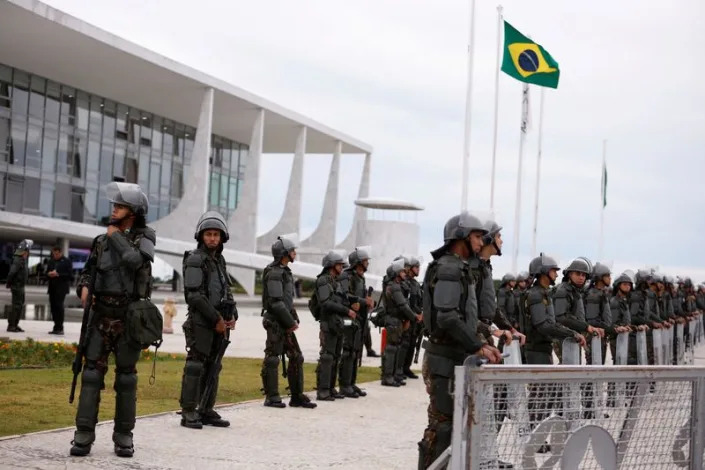
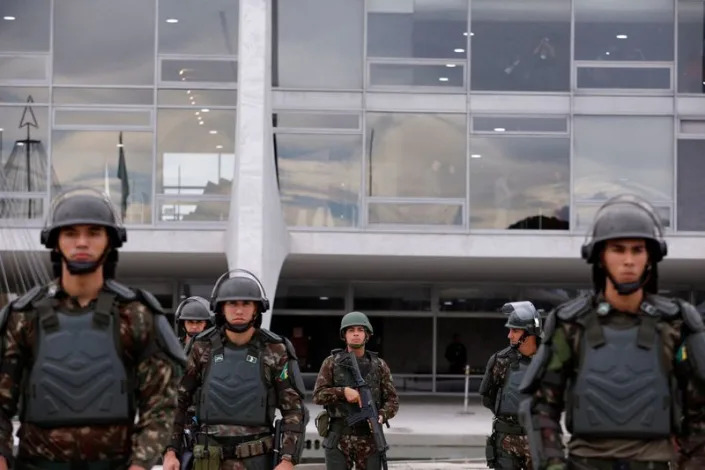
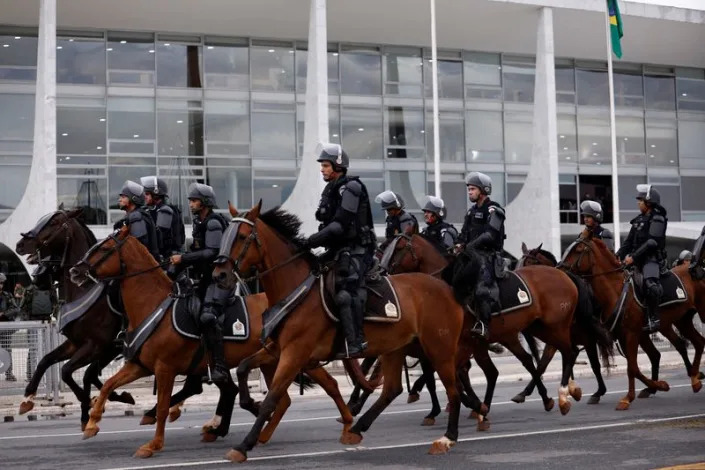
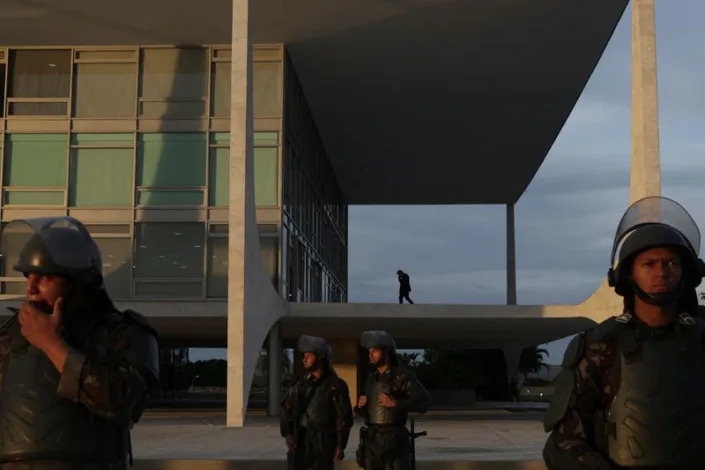
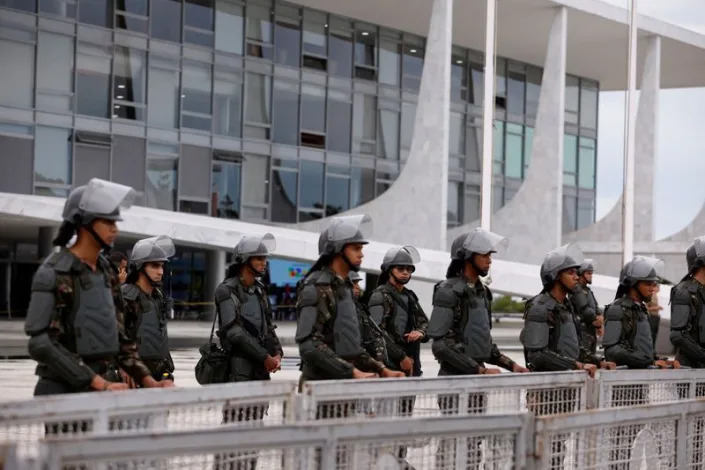
Aftermath of Brazil's anti-democratic riots
Wed, January 11, 2023
By Ricardo Brito and Anthony Boadle
BRASILIA (Reuters) -Brazilian federal prosecutors on Wednesday requested the investigation of three congressional allies of former President Jair Bolsonaro for allegedly inciting the worst attack on the country's democratic institutions in decades.
The call for the probe came as the government of leftist President Luiz Inacio Lula da Silva had prepared stepped-up security measures to face renewed protests on Wednesday, but mass demonstrations proposed on pro-Bolsonaro social media to "retake power" failed to materialize.
Police said 1,159 people arrested in connection with Sunday's storming of government building in Brasilia remained in custody. Some 684 others were released for "humanitarian reasons" after detention, including elderly people, those with health issues and parents of young children, police said.
Organizers of the anti-government demonstrations have called in recent weeks on social media to block roads and refineries, bring down power lines and cause enough chaos to prompt a military coup to overturn the election that Bolsonaro lost to Lula last October.
Ricardo Cappelli, the federal official in charge of public security in the capital appointed in the wake of Sunday's riots, said all security forces had been mobilized to prevent a repeat of the rampage, when thousands of Bolsonaro supporters staged protests in Brasilia, ransacking the Supreme Court, Congress and presidential offices.
"Those who lost the election and are trying to create a crisis will not succeed," Cappelli told a news conference.
Lula said on Wednesday that those involved in Sunday's attack would have the right to defend themselves but any proven wrongdoing will be punished. He also criticized Bolsonaro for not accepting the election result and called those who stormed and vandalized public buildings in the capital "crazy".
Supreme Court Justice Alexandre de Moraes issued a ban on roadblocks that have been used by anti-government demonstrators to create economic disruption, and ordered local authorities to prevent the storming of public buildings.
The Supreme Court on Wednesday upheld Moraes's arrest warrant for Anderson Torres, Bolsonaro's former justice minister who oversaw public security in Brasilia during Sunday's riots. Moraes accused Torres of "negligence and connivance".
Torres was fired for his failure to stop Sunday's chaos and his arrest warrant alleged complicity with the demonstrators, who marched to the center of the capital under police escort. Torres said on Tuesday he would return to Brazil to face charges from Florida, where he has been on vacation since before the riots.
Moraes also ordered the arrest of Fabio Augusto Vieira, the head of Brasilia's military police, one of a number of officials responsible for protecting government buildings in Brasilia. Vieira hasn't made any public comment since the order was issued.
The court also upheld the 90-day removal from office of former Brasilia Governor Ibaneis Rocha, Torres's former boss.
Prosecutors have also sought to freeze Bolsonaro's assets.
Despite the threat of new protests, Brazilian financial markets closed higher, with Brazil's benchmark stock index Bovespa rising 1.5%.
"So far, despite the polarized environment, evidenced by a violent invasion of Brazil's state buildings on Jan. 8, we see reasons to believe that governability will not be an immediate issue," economists at JPMorgan said.
Bolsonaro, who left Brazil 48 hours before his term ended at the end of December and has yet to concede defeat to Lula, told media from Florida that he planned to return to Brazil earlier than planned for medical reasons, without specifying a date.
(Reporting by Ricardo Brito in Brasilia, Steven Grattan and Gabriel Araujo in Sao Paulo, Writing by Anthony Boadle; Editing by Brad Haynes, Chizu Nomiyama, Deepa Babington and Kenneth Maxwell)





Aftermath of Brazil's anti-democratic riots
Wed, January 11, 2023
By Ricardo Brito and Anthony Boadle
BRASILIA (Reuters) -Brazilian federal prosecutors on Wednesday requested the investigation of three congressional allies of former President Jair Bolsonaro for allegedly inciting the worst attack on the country's democratic institutions in decades.
The call for the probe came as the government of leftist President Luiz Inacio Lula da Silva had prepared stepped-up security measures to face renewed protests on Wednesday, but mass demonstrations proposed on pro-Bolsonaro social media to "retake power" failed to materialize.
Police said 1,159 people arrested in connection with Sunday's storming of government building in Brasilia remained in custody. Some 684 others were released for "humanitarian reasons" after detention, including elderly people, those with health issues and parents of young children, police said.
Organizers of the anti-government demonstrations have called in recent weeks on social media to block roads and refineries, bring down power lines and cause enough chaos to prompt a military coup to overturn the election that Bolsonaro lost to Lula last October.
Ricardo Cappelli, the federal official in charge of public security in the capital appointed in the wake of Sunday's riots, said all security forces had been mobilized to prevent a repeat of the rampage, when thousands of Bolsonaro supporters staged protests in Brasilia, ransacking the Supreme Court, Congress and presidential offices.
"Those who lost the election and are trying to create a crisis will not succeed," Cappelli told a news conference.
Lula said on Wednesday that those involved in Sunday's attack would have the right to defend themselves but any proven wrongdoing will be punished. He also criticized Bolsonaro for not accepting the election result and called those who stormed and vandalized public buildings in the capital "crazy".
Supreme Court Justice Alexandre de Moraes issued a ban on roadblocks that have been used by anti-government demonstrators to create economic disruption, and ordered local authorities to prevent the storming of public buildings.
The Supreme Court on Wednesday upheld Moraes's arrest warrant for Anderson Torres, Bolsonaro's former justice minister who oversaw public security in Brasilia during Sunday's riots. Moraes accused Torres of "negligence and connivance".
Torres was fired for his failure to stop Sunday's chaos and his arrest warrant alleged complicity with the demonstrators, who marched to the center of the capital under police escort. Torres said on Tuesday he would return to Brazil to face charges from Florida, where he has been on vacation since before the riots.
Moraes also ordered the arrest of Fabio Augusto Vieira, the head of Brasilia's military police, one of a number of officials responsible for protecting government buildings in Brasilia. Vieira hasn't made any public comment since the order was issued.
The court also upheld the 90-day removal from office of former Brasilia Governor Ibaneis Rocha, Torres's former boss.
Prosecutors have also sought to freeze Bolsonaro's assets.
Despite the threat of new protests, Brazilian financial markets closed higher, with Brazil's benchmark stock index Bovespa rising 1.5%.
"So far, despite the polarized environment, evidenced by a violent invasion of Brazil's state buildings on Jan. 8, we see reasons to believe that governability will not be an immediate issue," economists at JPMorgan said.
Bolsonaro, who left Brazil 48 hours before his term ended at the end of December and has yet to concede defeat to Lula, told media from Florida that he planned to return to Brazil earlier than planned for medical reasons, without specifying a date.
(Reporting by Ricardo Brito in Brasilia, Steven Grattan and Gabriel Araujo in Sao Paulo, Writing by Anthony Boadle; Editing by Brad Haynes, Chizu Nomiyama, Deepa Babington and Kenneth Maxwell)
Bolsonaro party boss says violent Brasilia protesters will be expelled
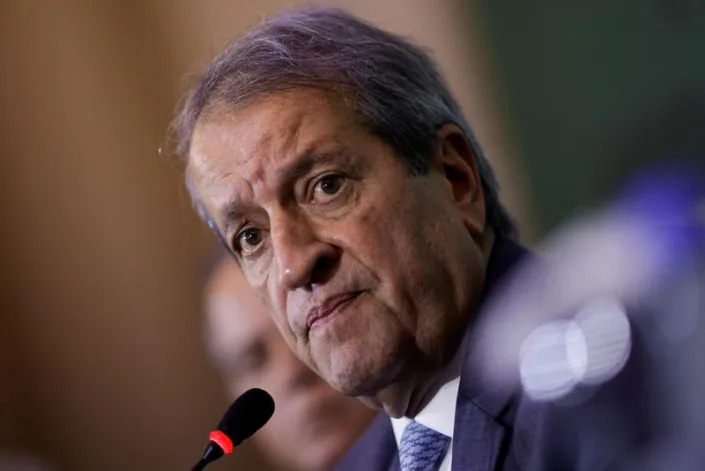
Brazil's Liberal Party President Valdemar Costa Neto attends a news conference in Brasilia
Wed, January 11, 2023
By Anthony Boadle and Ricardo Brito
BRASILIA (Reuters) - The leader of far-right former President Jair Bolsonaro's political party said on Wednesday that any member identified in videos taking part in the ransacking of government buildings on Sunday would be immediately expelled from the party.
Valdemar Costa Neto, president of the right-wing Liberal Party, said his party, the largest in Brazil's Congress, condemned the rampage on Sunday in which Bolsonaro supporters vandalized the Supreme Court, Congress and presidential palace.
"If members of the party are seen on videos smashing up those government buildings, we will expel them right away," he said in an interview, adding that the vandalism was caused by an extremist minority that did not represent his party.
Bolsonaro, an anti-establishment populist who joined the party to have a electoral vehicle for last year's election, has yet to concede defeat to leftist President Luiz Inacio Lula da Silva. He has not publicly condemned supporters who protested his loss and called for a military coup to restore him to power.
Costa Neto's party has sought to distance itself from the violence as it seeks to lead the opposition to Lula. The party became the largest in both chambers of Congress thanks to Bolsonaro's popularity, though the far-right leader himself narrowly lost his bid for re-election.
Lula's 11-day-old government braced on Wednesday for fresh demonstrations to "retake power" called by Bolsonaro supporters.
Bolsonaro, who left Brazil for Florida 48 hours before his term ended, said on social media that he would return to Brazil earlier than planned for medical reasons.
Costa Neto told Reuters he hopes Bolsonaro will return to Brazil soon to lead Brazil's political right into local elections in 2024 and become its presidential candidate in 2026.
Party officials said Bolsonaro's absence from the country was squandering the political capital that he gained in the election, in which 58 million Brazilians voted for him.
While the PL party has recognized the election result, Bolsonaro has suggested without any evidence that the election was stolen by manipulating Brazil's electronic voting system.
Costa Neto said Bolsonaro's charisma will help the party grow further in municipal elections next year when he expects the PL to increase the number of affiliated mayors from 352 at present to at least 1,500.
"All he needs to do is appear and he draws crowds," said Costa Neto, whose party is flush with 1.2 billion reais ($232 million) from a public election fund, based on the number of seats it won in the lower chamber of Congress.
Bolsonaro, whose nationalist populism sharply polarized Brazil's electorate during his four-year term, has been named honorary president of the PL. He and his wife Michelle Bolsonaro will have offices at party headquarters with paid salaries.
(Reporting by Anthony Boadle and Ricardo Brito; Editing by Brad Haynes and Deepa Babington)
Exclusive-U.S. and Brazil lawmakers seek to cooperate on investigation of Brasilia riots
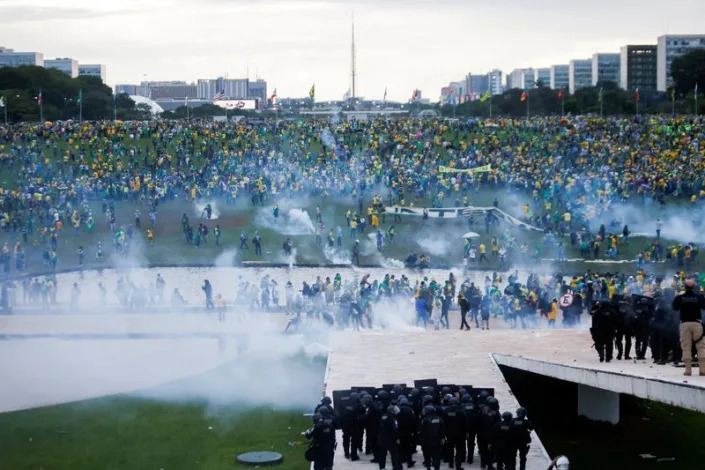
Supporters of Brazil's former President Jair Bolsonaro demonstrate against President Luiz Inacio Lula da Silva, in Brasilia
Wed, January 11, 2023
By Gram Slattery, Brad Haynes and Maria Carolina Marcello
WASHINGTON/BRASILIA (Reuters) -U.S. and Brazilian lawmakers are looking for ways to cooperate on an investigation into violent protests that rampaged through Brasilia this weekend, sharing lessons from inquiries into the attack on the U.S. Capitol, people familiar with the talks said.
The initial discussions occurred as more than 70 lawmakers in the two countries signed a joint statement denouncing "anti-democratic" forces trying to overturn recent elections in their nations with political violence.
Supporters of former President Jair Bolsonaro ransacked Brazil's Congress, Supreme Court and presidential palace on Sunday, calling for a military coup to overturn the October election won by President Luiz Inacio Lula da Silva.
U.S. Representative Bennie Thompson, chairman of the recently dissolved House committee that investigated the Jan. 6, 2021, attack on the U.S. Capitol, is one lawmaker whose office is discussing collaboration, according to one of the sources.
"I am extremely proud of the January 6 Select Committee's work and final report. If (it) serves as a model for similar investigations, I will help out in anyway possible," Thompson said in a written statement.
Brazil's Senate President Rodrigo Pacheco has also discussed the idea of such an exchange with the top U.S. diplomat in Brasilia, said another person familiar with the conversation.
The source, who is close to Pacheco, said the U.S. embassy's chargé d'affaires, Douglas Koneff, was receptive to the idea of sharing know-how from the investigation of then-President Donald Trump's supporters who attacked the Capitol in a failed attempt to stop Congress from certifying Joe Biden's election win.
Pacheco's office and the U.S. embassy in Brasilia did not immediately respond to requests for comment.
U.S. Secretary of State Antony Blinken said on Wednesday that Washington had not received any specific requests from Brazil regarding the recent violence in Brasilia, but it would respond "expeditiously" if and when a request arrives.
Separately, a group of 74 federal lawmakers in the United States and Brazil released a joint statement on Wednesday condemning the political violence in Brasilia and Washington that came two years and two days apart.
The statement, signed mainly by progressive lawmakers in both countries, was articulated by the Washington Brazil Office, a group promoting bilateral dialogue in defense of human rights and sustainable development.
"It is no secret that ultra-right agitators in Brazil and the United States are coordinating efforts," they wrote, citing ties between associates of Trump and Bolsonaro. "Just as far right extremists are coordinating their efforts to undermine democracy, we must stand united in our efforts to protect it."
The Jan. 6 committee's final report, released last month, said Trump should face criminal charges for inciting the deadly riot. The report listed 17 specific findings, discussed the legal implications of actions by the former president and some of his associates and included criminal referrals of Trump and other individuals to the Justice Department.
(Reporting by Gram Slattery in Washington, Brad Haynes in Sao Paulo and Maria Carolina Marcello in Brasilia; Editing by Christian Plumb, Howard Goller and Cynthia Osterman)

Brazil's Liberal Party President Valdemar Costa Neto attends a news conference in Brasilia
Wed, January 11, 2023
By Anthony Boadle and Ricardo Brito
BRASILIA (Reuters) - The leader of far-right former President Jair Bolsonaro's political party said on Wednesday that any member identified in videos taking part in the ransacking of government buildings on Sunday would be immediately expelled from the party.
Valdemar Costa Neto, president of the right-wing Liberal Party, said his party, the largest in Brazil's Congress, condemned the rampage on Sunday in which Bolsonaro supporters vandalized the Supreme Court, Congress and presidential palace.
"If members of the party are seen on videos smashing up those government buildings, we will expel them right away," he said in an interview, adding that the vandalism was caused by an extremist minority that did not represent his party.
Bolsonaro, an anti-establishment populist who joined the party to have a electoral vehicle for last year's election, has yet to concede defeat to leftist President Luiz Inacio Lula da Silva. He has not publicly condemned supporters who protested his loss and called for a military coup to restore him to power.
Costa Neto's party has sought to distance itself from the violence as it seeks to lead the opposition to Lula. The party became the largest in both chambers of Congress thanks to Bolsonaro's popularity, though the far-right leader himself narrowly lost his bid for re-election.
Lula's 11-day-old government braced on Wednesday for fresh demonstrations to "retake power" called by Bolsonaro supporters.
Bolsonaro, who left Brazil for Florida 48 hours before his term ended, said on social media that he would return to Brazil earlier than planned for medical reasons.
Costa Neto told Reuters he hopes Bolsonaro will return to Brazil soon to lead Brazil's political right into local elections in 2024 and become its presidential candidate in 2026.
Party officials said Bolsonaro's absence from the country was squandering the political capital that he gained in the election, in which 58 million Brazilians voted for him.
While the PL party has recognized the election result, Bolsonaro has suggested without any evidence that the election was stolen by manipulating Brazil's electronic voting system.
Costa Neto said Bolsonaro's charisma will help the party grow further in municipal elections next year when he expects the PL to increase the number of affiliated mayors from 352 at present to at least 1,500.
"All he needs to do is appear and he draws crowds," said Costa Neto, whose party is flush with 1.2 billion reais ($232 million) from a public election fund, based on the number of seats it won in the lower chamber of Congress.
Bolsonaro, whose nationalist populism sharply polarized Brazil's electorate during his four-year term, has been named honorary president of the PL. He and his wife Michelle Bolsonaro will have offices at party headquarters with paid salaries.
(Reporting by Anthony Boadle and Ricardo Brito; Editing by Brad Haynes and Deepa Babington)
Exclusive-U.S. and Brazil lawmakers seek to cooperate on investigation of Brasilia riots

Supporters of Brazil's former President Jair Bolsonaro demonstrate against President Luiz Inacio Lula da Silva, in Brasilia
Wed, January 11, 2023
By Gram Slattery, Brad Haynes and Maria Carolina Marcello
WASHINGTON/BRASILIA (Reuters) -U.S. and Brazilian lawmakers are looking for ways to cooperate on an investigation into violent protests that rampaged through Brasilia this weekend, sharing lessons from inquiries into the attack on the U.S. Capitol, people familiar with the talks said.
The initial discussions occurred as more than 70 lawmakers in the two countries signed a joint statement denouncing "anti-democratic" forces trying to overturn recent elections in their nations with political violence.
Supporters of former President Jair Bolsonaro ransacked Brazil's Congress, Supreme Court and presidential palace on Sunday, calling for a military coup to overturn the October election won by President Luiz Inacio Lula da Silva.
U.S. Representative Bennie Thompson, chairman of the recently dissolved House committee that investigated the Jan. 6, 2021, attack on the U.S. Capitol, is one lawmaker whose office is discussing collaboration, according to one of the sources.
"I am extremely proud of the January 6 Select Committee's work and final report. If (it) serves as a model for similar investigations, I will help out in anyway possible," Thompson said in a written statement.
Brazil's Senate President Rodrigo Pacheco has also discussed the idea of such an exchange with the top U.S. diplomat in Brasilia, said another person familiar with the conversation.
The source, who is close to Pacheco, said the U.S. embassy's chargé d'affaires, Douglas Koneff, was receptive to the idea of sharing know-how from the investigation of then-President Donald Trump's supporters who attacked the Capitol in a failed attempt to stop Congress from certifying Joe Biden's election win.
Pacheco's office and the U.S. embassy in Brasilia did not immediately respond to requests for comment.
U.S. Secretary of State Antony Blinken said on Wednesday that Washington had not received any specific requests from Brazil regarding the recent violence in Brasilia, but it would respond "expeditiously" if and when a request arrives.
Separately, a group of 74 federal lawmakers in the United States and Brazil released a joint statement on Wednesday condemning the political violence in Brasilia and Washington that came two years and two days apart.
The statement, signed mainly by progressive lawmakers in both countries, was articulated by the Washington Brazil Office, a group promoting bilateral dialogue in defense of human rights and sustainable development.
"It is no secret that ultra-right agitators in Brazil and the United States are coordinating efforts," they wrote, citing ties between associates of Trump and Bolsonaro. "Just as far right extremists are coordinating their efforts to undermine democracy, we must stand united in our efforts to protect it."
The Jan. 6 committee's final report, released last month, said Trump should face criminal charges for inciting the deadly riot. The report listed 17 specific findings, discussed the legal implications of actions by the former president and some of his associates and included criminal referrals of Trump and other individuals to the Justice Department.
(Reporting by Gram Slattery in Washington, Brad Haynes in Sao Paulo and Maria Carolina Marcello in Brasilia; Editing by Christian Plumb, Howard Goller and Cynthia Osterman)
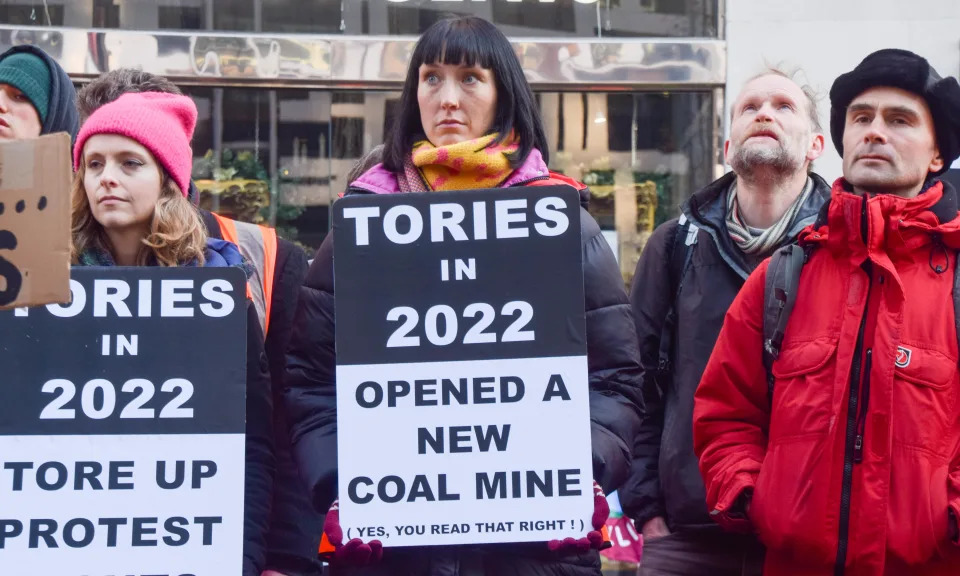







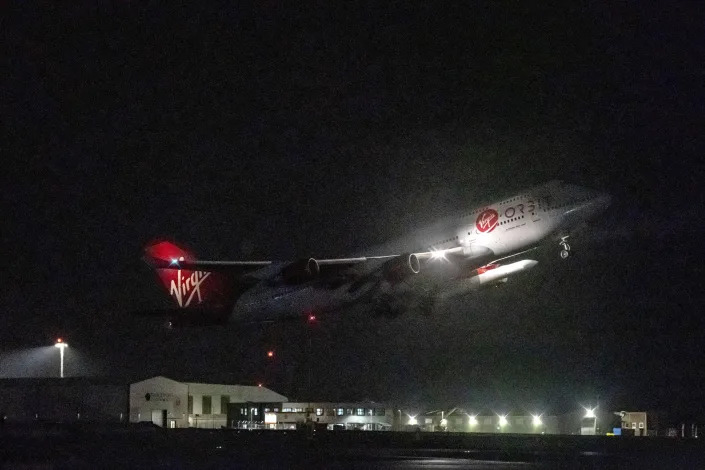




 France 24US speaker debacle: New Congress marked by deep Republican divisions
France 24US speaker debacle: New Congress marked by deep Republican divisions
 NBC NewsFull Panel: ‘GOP struggles to get its House together'
NBC NewsFull Panel: ‘GOP struggles to get its House together'
